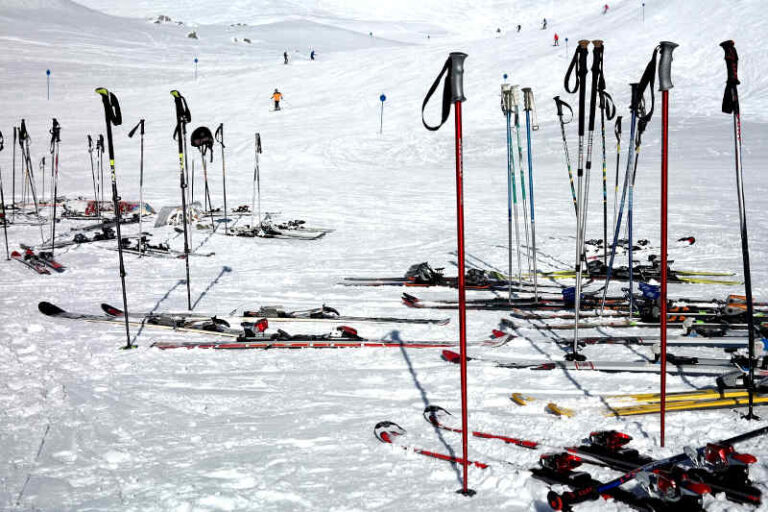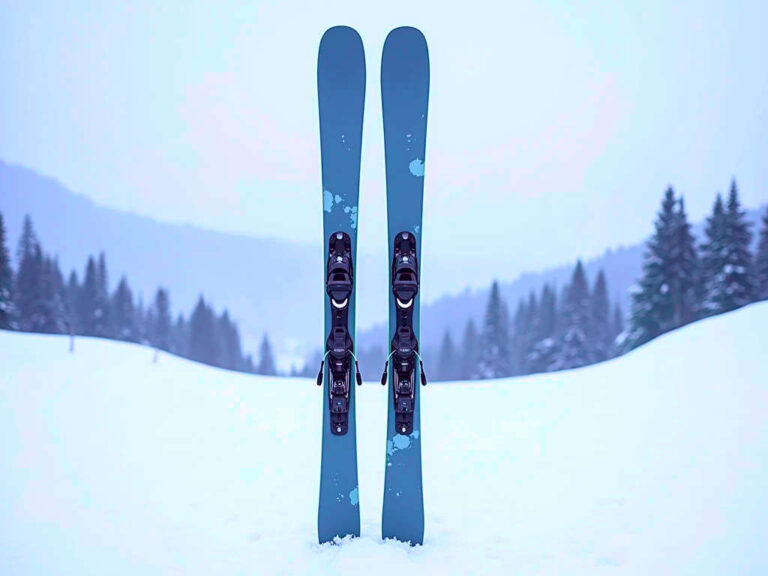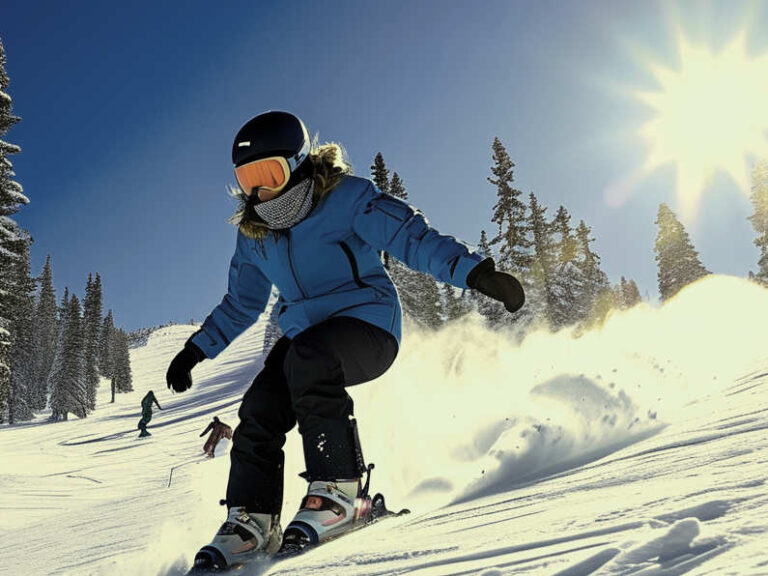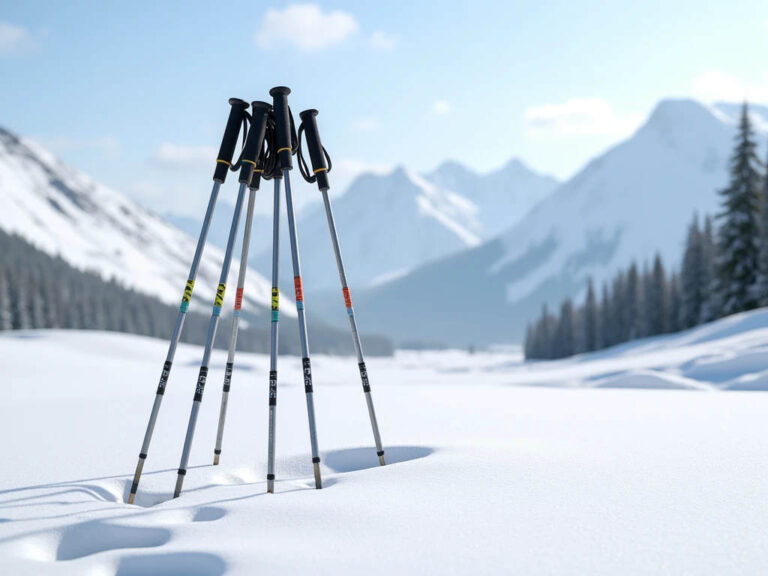Carbon vs. Aluminum Ski Poles: Which Should You Choose?
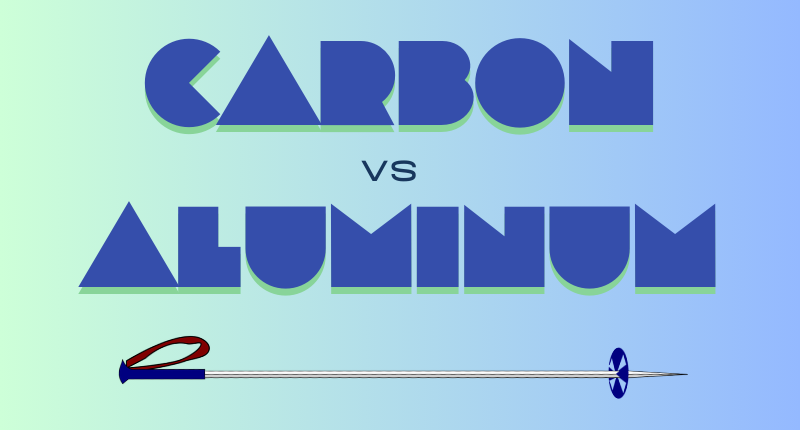
Ski poles might not steal the spotlight like skis or boots, but they’re a crucial part of your setup. Choosing between carbon and aluminum ski poles isn’t just about style; it’s about performance, durability, and comfort on the slopes. Let’s break it all down so you can make an informed decision.
Strength and Durability: Aluminum vs. Carbon
Are aluminum poles stronger than carbon?
Yes, aluminum ski poles are generally stronger in terms of impact resistance. They can take a beating if you accidentally smack them against a rock or jam them into hard snow. Aluminum tends to bend under extreme pressure, which means it’s less likely to break outright.
Are carbon ski poles durable?
Carbon poles are durable, but in a different way. They’re engineered to handle regular use and minor impacts. However, they’re not as forgiving as aluminum when it comes to severe impacts. A hard crash could cause carbon poles to crack or snap, so they require a bit more care.
Flexibility and Stiffness: How They Feel on the Slopes
Does carbon flex more than aluminum?
Surprisingly, yes! Carbon poles have a natural flex, which helps absorb vibrations. This makes them a good choice for skiers who want a smoother feel, especially on uneven terrain.
Is carbon fiber or aluminum stiffer?
Aluminum poles are stiffer overall. This stiffness provides solid feedback and control, especially during aggressive turns. However, they don’t dampen vibrations as well as carbon poles, which can make them feel harsher in choppy snow.
Weight: The Numbers That Matter
How much does a carbon fiber ski pole weigh?
Carbon poles are impressively light, weighing around 12 to 16 ounces per pair. Their featherweight design reduces arm fatigue, making them popular with advanced skiers and those who prioritize performance.
How much does an aluminum ski pole weigh?
Aluminum poles weigh more, averaging 16 to 20 ounces per pair. While the extra weight might seem like a downside, it can offer stability and durability that many beginner and recreational skiers appreciate.
Comparison of Aluminum and Carbon Ski Poles
A handy chart to compare features side-by-side:
| Feature | Aluminum Ski Poles | Carbon Ski Poles |
|---|---|---|
| Durability | Very durable; resistant to bending and breaking. Bends can often be repaired. | Durable but prone to snapping under extreme stress. |
| Strength | Strong but can dent from impacts. | High strength-to-weight ratio; resists deformation well. |
| Weight | Heavier compared to carbon poles. | Extremely lightweight, reducing fatigue. |
| Shock Absorption | Poor vibration damping; transmits shocks to wrists. | Excellent shock absorption; smooths out vibrations. |
| Flexibility | Less flexible; more likely to bend permanently. | Flexible and returns to shape under stress. |
| Performance | Reliable for casual and rugged use; less suited for racing. | Ideal for performance and racing due to lightweight and control. |
| Affordability | Affordable and widely available. | Expensive and may not fit tight budgets. |
| Aesthetic Wear | Prone to scratches and visible dents over time. | Retains sleek look but can crack or delaminate. |
| Impact Resistance | Resists most impacts but may dent instead of bending. | Prone to cracking or snapping under sharp impacts. |
Straight From the Horse’s Mouth: What do people on forums say?
Here is a summary of the thoughts of skiers from many forum posts about the pros and cons of carbon poles:
Pros of Carbon Ski Poles
- Lightweight: A recurring advantage mentioned is the lower weight of carbon poles, which reduces fatigue and allows for better control and precision in pole plants.
- Shock Absorption: Carbon materials are praised for their ability to dampen vibrations, making them a smoother option on uneven terrain.
- High Performance: Skiers noted that carbon poles improve swing weight and responsiveness, making them a popular choice for backcountry and advanced downhill skiing.
- Stiffness: The rigidity of carbon poles enhances their efficiency for aggressive skiing and precise maneuvers.
Cons of Carbon Ski Poles
- Prone to Breaking: The most significant drawback is their brittleness. While they rarely bend, carbon poles can break completely upon high-impact collisions, such as with trees or rocks, which can end a ski day.
- Cost: Many forum users felt that the price of carbon poles is steep compared to aluminum poles, which are much more affordable.
- Durability Concerns: Some users mentioned that sharp ski edges or excessive wear can damage the carbon material over time.
- Special Care Needed: Carbon poles require more careful handling and storage to prevent premature wear or breakage.
- Too Much Flex: Often flex excessively, which some skiers find frustrating during pushing motions
General Sentiment
The sentiment on whether carbon poles are worth the investment is mixed. Skiers who value performance and lightweight equipment, especially for backcountry touring or competitive skiing, often feel the higher cost is justified. However, those prioritizing durability and cost-effectiveness lean toward aluminum. Many suggest carbon poles are ideal for experienced skiers who are less likely to expose their gear to severe impacts.
Cost vs. Value: Are Carbon Poles Worth It?
So the big question is: are carbon fiber ski poles worth it?
As usual in life, there’s not really a straight answer. It depends on what you’re looking for. Carbon poles can be worth it if you value lightness and performance, especially for longer days or challenging runs. They cost more than aluminum poles, but some experienced skiers find the investment worthwhile for the comfort and efficiency they provide.
For those on a budget or who ski less frequently, aluminum poles offer excellent value. They’re durable, affordable, and reliable for all-around use.
Choosing What’s Best for You
If you want a lightweight, high-performance pole and don’t mind the higher price tag, carbon is a great choice. If you prefer a stronger, more affordable option that can withstand rough handling, aluminum might be your best bet. We’ve got a few recommended ski poles here.
Ultimately, the right pole depends on your skiing style, experience level, and priorities. The good news? Both materials have their merits, so you can’t go too far wrong.
Quick Quiz: Are Aluminum or Carbon Ski Poles Right for You?
Answer these five questions to find out which material suits your skiing style and needs best.
1. What is your skill level?
- A) Beginner or intermediate
- B) Advanced or expert
2. How often do you ski?
- A) Occasionally (a few times a year)
- B) Frequently (several times a month or more)
3. Do you prioritize durability or weight?
- A) Durability
- B) Weight
4. How do you usually handle your gear?
- A) I’m a bit rough and tumble; things take a beating.
- B) I’m careful and keep my equipment in good condition.
5. What’s your budget for ski poles?
- A) I’m looking for something affordable and reliable.
- B) I’m willing to spend more for top performance.
Results
- Mostly A’s: Aluminum ski poles are likely the best choice for you! They’re durable, affordable, and perfect for beginners or casual skiers who want something reliable.
- Mostly B’s: Carbon ski poles might be your match! They’re lightweight and high-performing, making them ideal for advanced skiers or those who prioritize comfort and efficiency on the slopes.
Use this quiz as a starting point, but don’t forget to try out poles in person if you can!
Leaning towards Aluminum but Want High Quality?
If the benefits of aluminum appeal to you and you are willing to pay a higher price for quality, consider a 7-series aluminum pole for better durability.
Still on the Fence? Consider Hybrid Ski Poles: The Best of Both Worlds
If you’re torn between the strength of aluminum and the lightness of carbon, hybrid ski poles might be your perfect solution. These poles combine the best features of both materials, offering a balanced mix of durability, performance, and comfort.
What Are Hybrid Ski Poles?
Hybrid ski poles feature a construction that uses both carbon and aluminum. Typically, the lower section is made of aluminum for added strength and impact resistance, while the upper section is carbon fiber to reduce weight and improve flexibility. This design caters to skiers who want a versatile option that bridges the gap between the two materials.
Benefits of Hybrid Ski Poles
1. Balanced Weight and Durability
Hybrid poles are lighter than full aluminum poles but more durable than full carbon poles. This balance makes them ideal for skiers who need a lightweight option that can handle rough use, such as in the backcountry or on challenging terrain.
2. Versatility for All Conditions
Because hybrid poles combine materials, they adapt well to various skiing styles and environments. Whether you’re carving groomers, skiing powder, or tackling mixed terrain, hybrids provide reliability and performance.
3. Reduced Risk of Breakage
The aluminum shaft at the bottom of hybrid poles can withstand impacts that might snap a full carbon pole. Meanwhile, the carbon upper section reduces overall weight, minimizing fatigue during long days on the slopes.
4. Cost-Effective Performance
Hybrid poles are often priced between aluminum and carbon poles. This middle ground allows you to enjoy the advantages of both materials without breaking the bank.
Who Should Use Hybrid Ski Poles?
- Intermediate to Advanced Skiers: Hybrids are perfect for skiers who want improved performance without committing to high-end carbon poles.
- Backcountry Enthusiasts: The combination of durability and lightness makes hybrids a solid choice for off-piste adventures.
- All-Mountain Skiers: If you ski a variety of conditions and terrains, hybrids provide dependable versatility.
Hybrid ski poles are an excellent compromise for skiers who want a little bit of everything. They’re durable enough to handle rough conditions, light enough to reduce fatigue, and versatile enough for various skiing styles. If you’re on the fence about choosing aluminum or carbon, hybrids just might be the answer.

by: Cory Willins
Cory is a dynamic and passionate content writer, specializing in sports-related topics. With over a decade of experience in the field, Cory has established… read more


